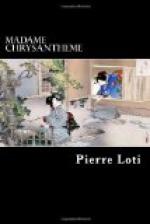“My dear creature, they are letters from my female friends.”
Oh! those friends of Chrysantheme, what funny little faces they have! That same box contains their portraits, their photographs stuck on visiting cards, which are printed on the back with the name of Uyeno, the fashionable photographer in Nagasaki,—little creatures fit only to figure daintily on painted fans, and who have striven to assume a dignified attitude when once their necks have been placed in the head-rest and they have been told: “Now don’t move!”
It would really amuse me to read her friends’ letters,—and above all my mousme’s answers.
XXIX.
August 10th.
This evening it rained heavily, and the night was thick and black. At about ten o’clock, on our return from one of the fashionable tea-houses we constantly frequent, we arrived,—Yves, Chrysantheme and myself,—at the certain familiar angle of the principal street, the certain turn where we must take leave of the lights and noises of the town, to clamber up the black steps and steep lanes which lead to our home at Diou-djen-dji.
There, before beginning our ascension, we must first buy lanterns from an old trades-woman called Madame Tres-Propre,[E] whose faithful customers we are. It is amazing what a quantity of these paper lanterns we consume. They are invariably decorated in the same way, with painted night-moths or bats; fastened to the ceiling at the further end of the shop, they hang in enormous clusters, and the old woman, seeing us arrive, gets upon a table to take them down. Gray or red are our usual choice; Madame Tres-Propre knows our preferences and leaves the green or blue lanterns aside. But it is always hard work to unhook one, on account of the little short sticks by which they are held, and the strings by which they are tied getting entangled together. In an exaggerated pantomime, Madame Tres-Propre expresses her despair at wasting so much of our valuable time: oh! if it only depended on her personal efforts! but ah, for the natural perversity of inanimate things which have no consideration for human dignity. With monkeyish antics, she even deems it her duty to threaten the lanterns and shake her fist at these inextricably tangled strings which have the presumption to delay us. It is all very well, but we know this maneuver by heart; and if the old lady loses patience, so do we. Chrysantheme, who is half asleep, is seized with a fit of kitten-like yawning which she does not even trouble to hide behind her hand, and which appears to be endless. She pulls a very long face, at the thought of the steep hill we must struggle up to-night through the pelting rain.
[Footnote E: In Japanese: O Sei-San.]
I have the same feeling, and am thoroughly annoyed.
To what purpose, good heavens, do I clamber up every evening to that suburb, when it offers me no attraction whatever?




